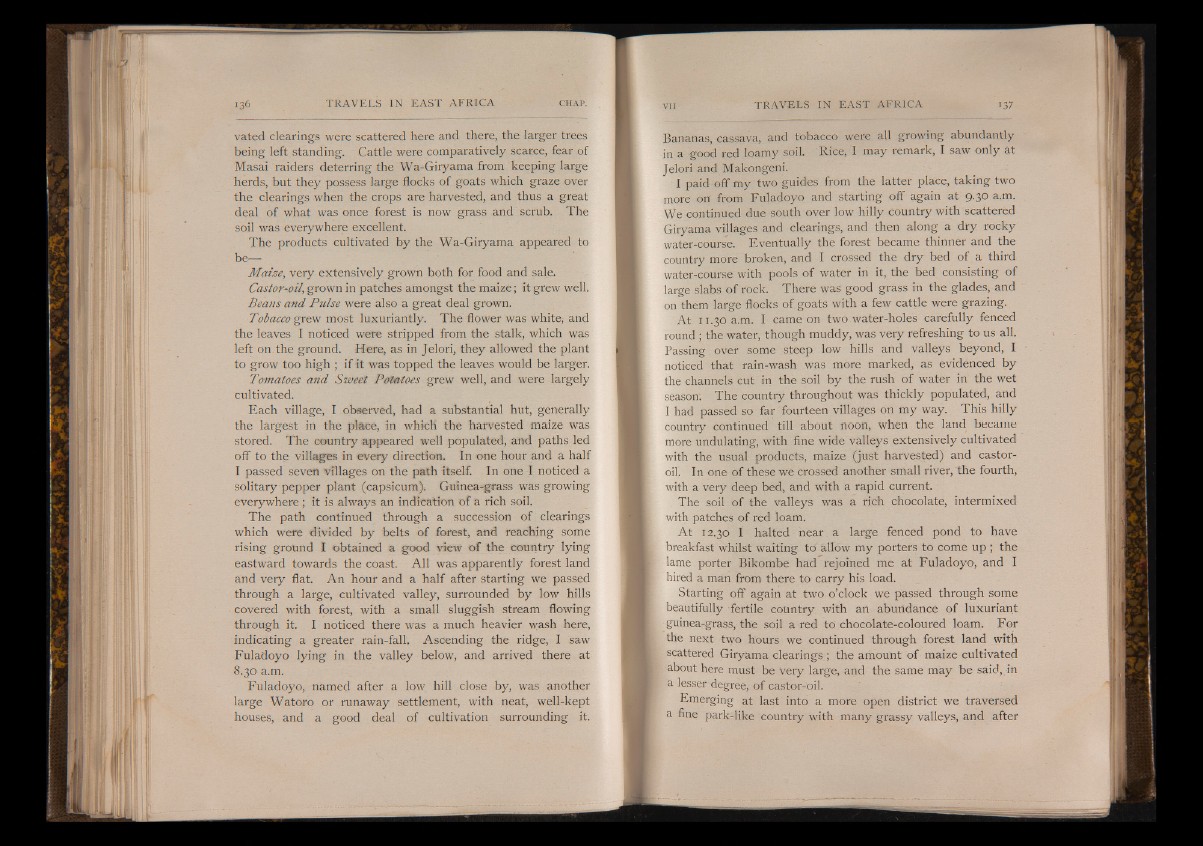
vated clearings were scattered here and there, the larger trees
being left standing. Cattle were comparatively scarce, fear of
Masai raiders deterring the Wa-Giryama from keeping large
herds, but they possess large flocks of goats which graze over
the clearings when the crops are harvested, and thus a great
deal of what was once forest is now grass and scrub. The
soil was everywhere excellent.
The products cultivated by the Wa-Giryama appeared to
be—
Maize, very extensively grown both for food and sale.
Castor-oil\ grown in patches amongst the maize; it grew well.
Beans and Pulse were also a great deal grown.
Tobacco grew most luxuriantly. The flower was white, and
the leaves I noticed were stripped from the stalk, which was
left on the ground. Here, as in Jelori, they allowed the plant
to grow too high ; if it was topped the leaves would be larger.
Tomatoes and Sweet Potatoes grew well, and were largely
cultivated.
Each village, I observed, had a substantial hut, generally
the largest in the place, in which the harvested maize was
stored. The country appeared well populated, and paths led
off to the villages in every direction. In one hour and a half
I passed seven villages on the path itself. In one I noticed a
solitary pepper plant (capsicum). Guinea-grass was growing
everywhere; it is always an indication of a rich soil.
The path continued through a succession of clearings
which were divided by belts of forest, and reaching some
rising ground I obtained a good view of the country lying
eastward towards the coast. All was apparently forest land
and very flat. An hour and a half after starting we passed
through a large, cultivated valley, surrounded by low hills
covered with forest, with a small sluggish stream flowing
through it. I noticed there was a much heavier wash here,
indicating a greater rain-fall. Ascending the ridge, I saw
Fuladoyo lying in the valley below, and arrived there at
8.30 a.m.
Fuladoyo, named after a low hill close by, was another
large Watoro or runaway settlement, with neat, well-kept
houses, and a good deal of cultivation surrounding it.
Bananas, cassava, and tobacco were all growing abundantly
in a good red loamy soil. Rice, I may remark, I saw only at
Jelori and Makongeni.
I paid off my two guides from the latter place, taking two
more on from Fuladoyo and starting off again at 9-3° a-m-
We continued due south over low hilly country with scattered
Giryama villages and clearings, and then along a dry rocky
water-course. Eventually the forest became thinner and the
country more broken, and I crossed the dry bed of a third
water-course with pools of water in it, the bed consisting of
large slabs of rock. There was good grass in the glades, and
on them large flocks of goats with a few cattle were grazing.
At 11.30 a.m. I came on two water-holes carefully fenced
round ; the water, though muddy, was very refreshing to us all.
Passing over some steep low hills and valleys beyond, I
noticed that rain-wash was more marked, as evidenced by
the channels cut in the soil by the rush of water in the wet
season. The country throughout was thickly populated, and
I had passed so far fourteen villages on my way. This hilly
country continued till about noon, when the land became
more undulating, with fine wide valleys extensively cultivated
with the usual products, maize (just harvested) and castor-
oil. In one of these we crossed another small river, the fourth,
with a very deep bed, and with a rapid current.
The soil of the valleys was a rich chocolate, intermixed
with patches of red loam.
At 12.30 I halted near a large fenced pond to have
breakfast whilst waiting to allow my porters to come up ; the
lame porter Bikombe had rejoined me at Fuladoyo, and I
hired a man from there to carry his load.
Starting off again at two o’clock we passed through some
beautifully fertile country with an abundance of luxuriant
guineargrass, the soil a red to chocolate-coloured loam. For
the next two hours we continued through forest land with
scattered Giryama clearings ; the amount of maize cultivated
about here must be very large, and the same may be said,, in
a lesser degree, of castor-oil.
Emerging at last into a more open district we traversed
a fine park-like country with many grassy valleys, and after